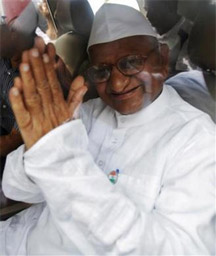NEW DELHI, (Reuters) – Sipping coconut water and honey, a self-styled Gandhian anti-corruption reformer ended a hunger strike on its 13th day yesterday, a protest that had sparked huge rallies across the country, exposed a weak government and ushered in a new middle-class political force.

After initially arresting Anna Hazare and dismissing him as an anarchist, Prime Minister Manmohan Singh’s government caved in to the demands of the 74-year-old as parliament backed anti-graft legislation that met many of his demands.
“It’s a proud moment for the country that a mass movement which was carried out for 13 days was peaceful and non-violent,” Hazare, wearing a crisp white kurta smock and cap, told cheering supporters from a stage at an open ground in New Delhi that has become the epicentre of a nationwide crusade.
“The people’s parliament is bigger than Delhi’s parliament.”
Hazare tapped a groundswell of public anger against endemic corruption, uniting the country’s bulging middle-class against a hapless political elite and underlining voter anger at Singh and the ruling Congress party.
Over 40,000 supporters flocked to witness Hazare break his fast, local media reported, while TV pictures showed hundreds of people dancing, celebrating and distributing sweets in the activist’s hometown in western India.
Tens of thousands of mostly urban and wired voters across India celebrated the achievement of an unprecedented movement that may usher in a new force in Indian politics and damage the ruling Congress party in crucial state elections next year.
The so-called Lokpal legislation was presented in early August, but activists slammed the draft version as toothless because the prime minister and judges were exempt from probes.
Hazare had demanded that the bill included bringing civil servants under a proposed corruption agency’s authority, ensured similar agencies at a state level and created a citizen’s charter.
In calling off the hunger strike, his second this year, the veteran activist fired a warning shot at lawmakers and the weary government, threatening to restart his agitation should parliament renege on its promises.
That threat, a headache for the ruling Congress party that will hope to move on from the crisis to tackle key economic reforms shelved in the political melee, came as another social activist cautioned against expecting “a miracle”.
“We have achieved the first milestone in having a strong Lokpal Act and it may take its own time. It’s not something you can expect today, tomorrow or next month,” Santosh Hegde, a former Supreme Court judge who sat on the panel that drafted the bill, was quoted by the Press Trust of India as saying.
“Let not the people of India expect a miracle.”
Hazare also declared his intentions to campaign against “corrupt” politicians in the 2014 general election, in a country where 30 percent of lower house MPs have pending criminal cases against them, according to research by the Association for Democratic Reforms.
Undermined by graft scandals and seen as out-of-touch with voters battling high inflation, Congress’ failure to deal with Hazare’s campaign before it flared up into a national issue spells danger for the ruling party in state polls next year ahead of the 2014 election.
While protests in India are not uncommon, the sight of many well-off young professionals using Twitter and Facebook taking to the streets of Asia’s third-largest economy suggest an awakening of a previously politically-ambivalent middle-class.
NATIONWIDE SUPPORT
“Anna wins it for the people,” splashed the front page of India’s Sunday Times newspaper, as grassroot activists across the country revelled in victory.









